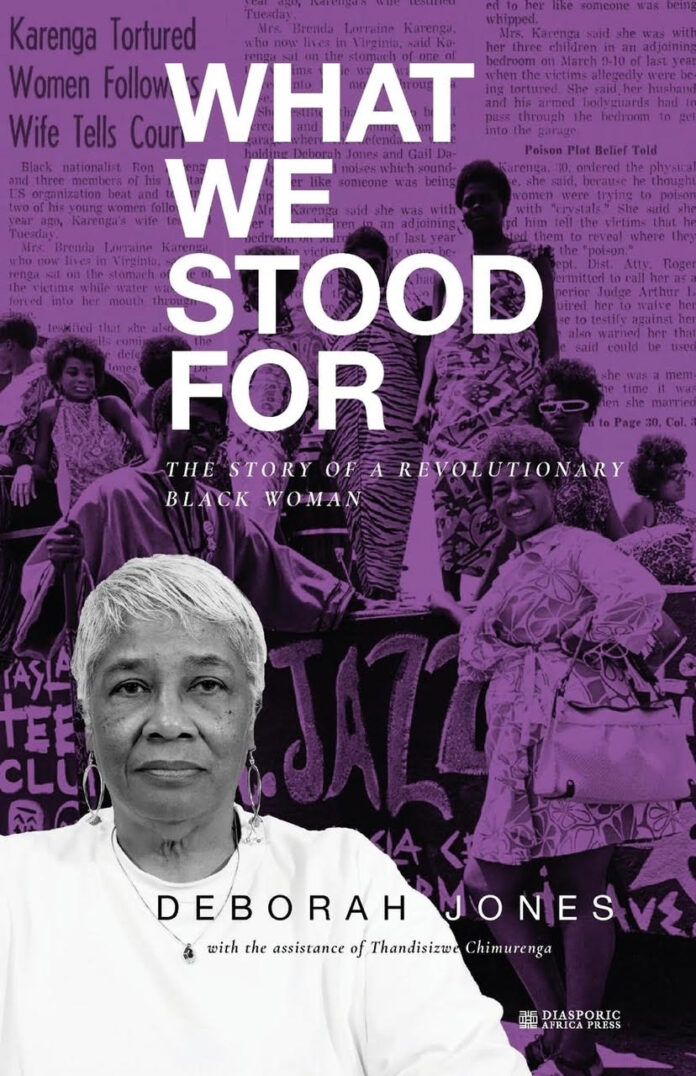
By Edward Henderson, California Black Media
Black revolutionaries of the 1960s and 1970s faced unimaginable discrimination, violence, obstruction and hostility from law enforcement, people who opposed their ideologies and activities — and even undercover agents of the federal government.
But what happens when the pain, torment and sabotage come from individuals they fought alongside, who they regarded as colleagues and “comrades?”
The newly released memoir “What We Stood For: The Story of a Revolutionary Black Woman,” written with the assistance of Thandisizwe Chimurenga, reveals the untold story of Los Angeles-based activist and advocate Deborah Jones. It details the harrowing experiences of Jones, 73, as a member of the Us Organization, one of the leading Black Power groups in California and the United States, from 1968 to 1970.
The US Organization was a political rival to the Black Panther Party.
Two years after Jones joined the Us Organization’s Taifa (Nation) Dance Troupe, Maulana Karenga, cofounder of the organization known for creating the African American holiday of Kwanzaa, accused Jones and Gail “Idili” Davis, another member, of trying to poison him.
According to Jones, that accusation is false and baseless.
According to the account in the book, the women were held and tortured in Karenga’s garage over Mother’s Day weekend in 1970. In addition to describing this account and explaining Jones’ life afterward, the memoir also tells Jones’ story of growing up in Los Angeles in a loving, Pro-Black household, and her life’s calling of inspiring Black youth through Afro-centric teachings.
California Black Media spoke with co-writer Thandisizwe Chimurenga about her process working with Jones on the memoir and some of the sensitive subjects it includes.
Jones declined CBM’s interview request and deferred to Chimurenga.
“The main reason I wanted to be part of this project, I believe Debroah Jones and Gale Davis, the other woman who was tortured along with her, I believe they are used as a hammer against Karenga and this US Organization,” said Chimurenga.
“What I mean by that is: every year during Kwanzaa, people who don’t like Karenga or the US Organization — because they’ve adopted the beef of the Panthers vs the US organization — because of the anger and shock and hurt over the murders of Bunchy (Carter) and John (Huggins) — one of the things they say is ‘in addition to killing Bunchy and John,” they also tortured two sisters.”
Members of the US Organization were convicted for killing Black Panthers Carter and Huggins.
Declassified FBI files have since revealed that some of the tensions between the U.S. Organization and the Black Panthers were inflamed by secret federal agents.
Chimurenga says, with the book, she and Jones want to associate faces with the nameless women people often mention were tortured by the US organization.
“They have names. They are actual people. This is what their life is like,” said Chimurenga. “This is what Deborah says happened to her. I wanted to put the face and the name and her story out there. She’s not just a nameless cudgel.”
Chimurenga, who helped provide background and context in certain areas, was introduced to Jones in 2019 when Jones shared her story as part of California State University Northridge’s Tom and Ethel Bradley Center Black Power Archives Oral History Project.
The writing process took about two years to complete, Chimurenga says. She started with transcripts of the oral history given by Jones and continued with subsequent interviews via Zoom, in person and over the phone. She also utilized interviews with other revolutionaries from the period who provided additional context for Jones’ story along with her impact.
“My work is to help people amplify their voice. In my writing I attempt to be as descriptive and detailed as possible. Telling a story that needs to be told in a way it needs to be told. Because I believe in the importance of Black women’s stories, I believe that made her feel comfortable also,” she added.
Jones’ story can be seen as a cautionary one for others involved in the movements of today, Chimurenga shares, “to facilitate justice in a time of polarization and bigotry.”
“Deborah talks about not listening to her intuition, wanting to be involved and the obstacles that she faced and the things she saw. Especially for this generation of activists and the era of Me Too, Black Lives Matter,” Chimurenga states. “We see so many young people getting involved for the first time, so many young women coming to the forefront as leadership. We have to stop making the same mistakes over and over again. When we see leadership that is not accountable to anyone, that acts as if it has the right to be unaccountable, we need to confront it.”
“What We Stood For: The Story of a Revolutionary Black Woman” is available now via Diasporic Africa Press and Amazon.



